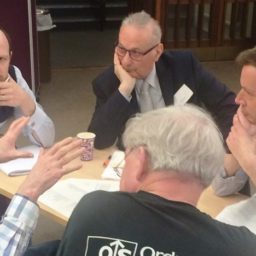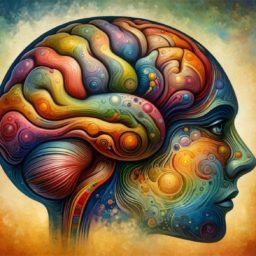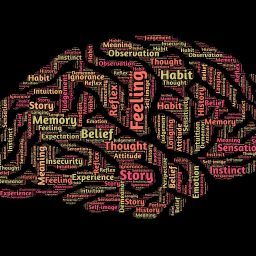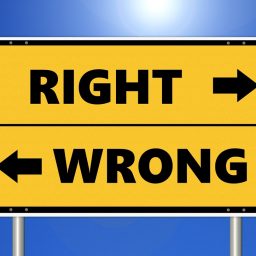
Teaching critical thinking alone is not a solution to helping people question their beliefs, it simply helps them to better post rationalize their beliefs. Credit: David Gurteen People: David GurteenDavid Gurteen Keynote speaker, writer and conversational facilitatorBooks: David GurteenA Conversation Architect Designs Strategic Conversations David GurteenAPM Conference: Conversational Leadership David Gurteen (2016)Being Truthful Versus Telling … Continue reading Teaching Critical Thinking Alone Is Not a Solution to Helping People Question Their Beliefs David Gurteen

In the book Enlightenment 2.0, Joseph Heath outlines a program for a second Enlightenment. The answer, he argues, lies in a new “slow politics.” It takes as its point of departure recent psychological and philosophical research that identifies the social and environmental preconditions for the exercise of rational thought. It is impossible to restore sanity … Continue reading Enlightenment 2.0: Restoring Sanity to Our Politics, Our Economy, and Our Lives by Joseph Heath (2014)

Thinking — or reasoning — involves objectively connecting present beliefs with evidence in order to believe something else. Credit: David T. Moore Comment: True reasoning requires a willingness to adjust our beliefs when faced with compelling evidence, a critical skill in both decision-making and leadership.Books: David T. MooreConnecting Beliefs and Evidence David T. MooreQuotations: David … Continue reading Connecting Beliefs and Evidence David T. Moore

The confidence people have in their beliefs is not a measure of the quality of evidence but of the coherence of the story that the mind has managed to construct. | Daniel Kahneman Continue reading Belief Coherence Daniel Kahneman

Peter Boghossian is an American philosopher and an assistant professor of philosophy at Portland State University. WebsitePeter BoghossianWikipediaPeter BoghossianTwitter@peterboghossianYouTubePeter BoghossianGooglePeter Boghossian Twitter Tweets by Peter Boghossian Posts: Peter BoghossianImpossible Conversations Navigating conversations across ideological dividesBooks: Peter BoghossianHow to Have Impossible Conversations: A Very Practical Guide by Peter Boghossian and James Lindsay (2019)Impossible Conversations Peter Boghossian … Continue reading Peter Boghossian American philosopher

Street Epistemology is a conversational tool that helps people reflect on the quality of their reasons and the reliability of their methods used to derive their confidence level in their deeply-held beliefs. | Anthony Magnabosco Continue reading What Is Street Epistemology? Anthony Magnabosco

Freethinkers are those who are willing to use their minds without prejudice and without fearing to understand things that clash with their own customs, privileges, or beliefs. This state of mind is not common, but it is essential for critical thinking. | Leo Tolstoy Continue reading Freethinkers’ Mindset Leo Tolstoy

New Discourses convened in October of 2019 in the National Liberal Club of London for a day-long conference titled Speaking Truth to Social Justice. There, Portland State University philosophy professor Peter Boghossian gave a talk about the need to “speak truth in the face of danger,” parrhesia, as the Ancient Greeks called it, as this … Continue reading The Way Forward Peter Boghossian (2019)

Few things are more dangerous than people who think they’re in possession of absolute truth. Credit: Peter Boghossian People: Peter BoghossianPeter Boghossian American philosopherPosts: Peter BoghossianImpossible Conversations Navigating conversations across ideological dividesBooks: Peter BoghossianHow to Have Impossible Conversations: A Very Practical Guide by Peter Boghossian and James Lindsay (2019)Impossible Conversations Peter Boghossian (2019)Impossible Conversations Navigating … Continue reading Perils of Absolute Certainty Peter Boghossian

Rather than constantly questioning and challenging our beliefs and being willing to think differently about the opportunities that are out there, we withdraw into what we’ve done before. And in a world that’s rapidly changing, that’s a formula for vulnerability. | John Hagel Continue reading Not Questioning and Challenging Our Beliefs Is a Formula for Vulnerability John Hagel

Your beliefs become your thoughts, Your thoughts become your words, Your words become your actions, Your actions become your habits, Your habits become your values, Your values become your destiny. | Mahatma Gandhi Continue reading Your Beliefs Become Your Thoughts Mahatma Gandhi

Perhaps the essence of the Liberal outlook could be summed up in a new decalogue, not intended to replace the old one but only to supplement it. The Ten Commandments that, as a teacher, I should wish to promulgate, might be set forth as follows: Do not feel absolutely certain of anything. Do not think it worthwhile to produce belief by concealing … | Bertrand Russell Continue reading Bertrand Russell’s Ten Commandments for Critical Thinking Bertrand Russell

Close Pop-up All Episodes This is the source material used to create this podcast. Tags: beliefs (66) | NotebookLM (6) | podcast (20)Google Web Search Photo Credits: Midjourney ()This page is part of a blook on Conversational Leadership. Parts of this book have restricted access. You can learn more about the book and how to obtain full … Continue reading Rethinking Our Beliefs Podcast generated by NotebookLM

Organizational culture is the attitudes, customs, rituals, values and beliefs shared by the members of an organization that govern their behavior. Organizational culture is emergent. It is the result of the everyday interactions, behaviors, and conversations by the members of an organization. Culture is the way that we do things around here that … | Dave Snowden Continue reading What Is Organizational Culture? Dave Snowden

Steven Sloman is a Professor of Cognitive, Linguistic, and Psychological Sciences at Brown University. Steven studies how people think: how we reason, make decisions and form attitudes and beliefs. WebsiteSloman LabYouTubeSteven SlomanGoogleSteven SlomanPosts: Steven SlomanThe Knowledge Delusion We know far less than we think we doBooks: Steven SlomanOur Beliefs Are Not Isolated Pieces of Data … Continue reading Steven Sloman Professor of Cognitive, Linguistic and Psychological Sciences

For some of our most important beliefs, we have no evidence at all, except that people we love and trust hold these beliefs. Considering how little we know, the confidence we have in our beliefs is preposterous – and it is also essential. | Daniel Kahneman Continue reading For Some of Our Most Important Beliefs, We Have No Evidence at All Daniel Kahneman

video player Why do we believe things that aren’t true? | Philip Fernbach Transcript One Transcript starting at 2:10 to 3:38. (I’ve highlighted some of the text to draw attention to the more pertinent points.) As human beings, false belief is our birthright. It stems from fundamental principles that govern the way our minds work … Continue reading Why Do We Believe Things That Aren’t True? Philip Fernbach (2017)

In this book, The Righteous Mind, Jonathan Haidt shows how moral judgments arise not from reason but from gut feelings. He shows why liberals, conservatives, and libertarians have such different intuitions about right and wrong, and he shows why each side is actually right about many of its central concerns. Credit: Amazon The Righteous Mind … Continue reading The Righteous Mind: Why Good People Are Divided by Politics and Religion Jonathan Haidt (2013)

Perhaps the clinching point is that trust is an essential ingredient of belief formation. Why? Because we don’t have the time to check the evidence for everything, so we have to take some things at face value. We trust doctors, chemists, and teachers. Even experts trust other experts, taking their data and outputs as inputs for their own … | Matthew Syed Continue reading Trust Is an Essential Ingredient of Belief Formation Matthew Syed


There is only one cause of unhappiness: the false beliefs you have in your head, beliefs so widespread, so commonly held, that it never occurs to you to question them. | Anthony de Mello Continue reading There Is Only One Cause of Unhappiness Anthony de Mello

Because so much disagreement remains hidden, our beliefs are not properly shaped by healthy scrutiny and debate. The absence of such argument also leads us to exaggerate the extent to which other people believe the way we do. | Thomas Gilovich Continue reading Our Beliefs Are Not Properly Shaped by Healthy Scrutiny and Debate Thomas Gilovich

Our beliefs are not isolated pieces of data that we can take and discard at will. Instead, beliefs are deeply intertwined with other beliefs, shared cultural values, and our identities. To discard a belief means discarding a whole host of other beliefs, forsaking our communities, going against those we trust and love, and in short, challenging our … | Steven Sloman Continue reading Our Beliefs Are Not Isolated Pieces of Data That We Can Take and Discard at Will Steven Sloman

Matthew Syed is a journalist, author, and broadcaster. Pursuing Cognitive Diversity | Matthew Syed WebsiteMatthew SyedWikipediaMatthew SyedTwitter@matthewsyedYouTubeMatthew SyedGoogleMatthew Syed Twitter Tweets by Matthew Syed Books: Matthew SyedMatthew Syed Journalist, author and broadcasterRebel Ideas: the Power of Diverse Thinking Matthew Syed (2019)Trust Is an Essential Ingredient of Belief Formation Matthew Syed Quotations: Matthew SyedTrust Is an … Continue reading Matthew Syed Journalist, author and broadcaster

Did you know that it’s actually possible for you to say “I don’t know enough about this to have an opinion”. | Richard Feynman Continue reading It’s OK Not to Have an Opinion Richard Feynman

It takes careful observation, and education, and reflection, and communication with others, just to scratch the surface of your beliefs. | Jordan Peterson Continue reading Scratching the Surface of Your Beliefs Jordan Peterson (2023)

The Difference Between Sense-making and Meaning-making What Are Beliefs? Close Pop-up all posts in this chapter What’s the Vibe? Please be patient as this may take up to a minute to load… Close If we are to create a better world, we need to make better sense of things and improve the decisions we make, … Continue reading Introduction: Knowledge Delusion We delude ourselves about what we know and how we make decisions

Introduction: Practicing Conversational Leadership Three Questions for Meaningful Conversations Close Pop-up all posts in this chapter What’s the Vibe? Please be patient as this may take up to a minute to load… Close Many factors, including conversational skills and habits, shape our ability to practice Conversational Leadership effectively. However, the most impactful factor is our … Continue reading Conversational Leadership Mindset Developing a Conversational Leadership mindset

Oral Public Discourse Storytelling ** Close Pop-up all posts in this chapter What’s the Vibe? Please be patient as this may take up to a minute to load… Close Narratives shape our understanding of the world and reinforce shared identities and values within a society. In contrast, the stories a culture tells about itself and … Continue reading Stories and Narratives The subtle differences between stories and narratives

Multipolar Traps or Moloch Traps Relationships ** Close Pop-up all posts in this chapter What’s the Vibe? Please be patient as this may take up to a minute to load… Close Colonialism has historically referred to the domination and control of one group or nation over another. However, the language of colonialism has recently been … Continue reading Avoiding Modern-day Colonialism Colonialism: the dominance, control, and exploitation by one group over another

There are several ways of attempting to “know something” (acquiring knowledge). Some of them are more reliable than others. Continue reading Ways of Knowing Ways of acquiring knowledge

Beliefs are ideas that we hold to be true. However, we have no evidence to support many of them. False beliefs lead us to the wrong conclusions. We need to question and challenge our beliefs continually. Continue reading What Are Beliefs? Ideas that are held to be true but not necessarily supported by any evidence

Making sound conclusions is crucial. Distinguishing between deductive, inductive, and abductive reasoning clarifies how we derive these conclusions. Understanding these reasoning forms enhances logical thinking and decision-making. Continue reading Three Forms of Reasoning Understanding deductive, inductive, and abductive logic

Belief systems shape our understanding of reality. They are interconnected networks of ideas, not always accurate representations of truth. Examining and evolving our beliefs, while challenging, is crucial for personal growth and social progress. Continue reading Belief Systems Our beliefs are not isolated pieces of data that we can take and discard at will

Belief Systems What Are Mindsets? Close Pop-up all posts in this chapter What’s the Vibe? Please be patient as this may take up to a minute to load… Close An attitude is a tendency to think or feel about someone or something in a certain way. Over time, we tend to form our attitudes from … Continue reading Attitudes A tendency to think, or feel about someone or something in a certain way

Attitudes Values Close Pop-up all posts in this chapter What’s the Vibe? Please be patient as this may take up to a minute to load… Close Mindsets are our mental attitudes or approaches to a particular situation or task. They are shaped by our beliefs, values, and experiences and can impact our ability to adapt … Continue reading What Are Mindsets? Ways of thinking, mental inclinations, dispositions, or frames of mind

Anecdote Circles Brainstorming Close Pop-up all posts in this chapter What’s the Vibe? Please be patient as this may take up to a minute to load… Close In challenging conversations, differing viewpoints can lead to tension and misunderstandings. A conversation covenant offers a structured approach to ensure respectful, constructive dialogue. By establishing agreed-upon guidelines, it … Continue reading Conversation Covenant Creating a psychologically safer space for difficult conversations

What Are Mindsets? What Are Morals? Close Pop-up all posts in this chapter What’s the Vibe? Please be patient as this may take up to a minute to load… Close Values are the basis of personal and collective judgments about what is valuable in life. They influence our decision-making on all sorts of issues, primarily … Continue reading Values Values are beliefs we hold that something is good or desirable

Values Knowledge and Information ** Close Pop-up all posts in this chapter What’s the Vibe? Please be patient as this may take up to a minute to load… Close Morals are values. They are a set of principles that help us evaluate and distinguish right from wrong, good from bad for ourselves and society. What … Continue reading What Are Morals? Principles of right or wrong behaviour

What Are Morals? The Argumentative Theory of Human Reason Close Pop-up all posts in this chapter What’s the Vibe? Please be patient as this may take up to a minute to load… Close Knowledge … Knowledge Our mind contains beliefs. We don’t know how these beliefs are stored, but it does not matter for my … Continue reading Knowledge and Information ** Knowledge and information are different substances

Polarization of opinions is becoming more prevalent in today’s society and is creating both unrest at the societal level as well as conflict within small groups with different views. Continue reading Opinion Polarization We are polarized across political, religious, moral, and racial divides

Our beliefs are deeply rooted and are based on little evidence, yet we argue and fight over them. It is essential that we better understand the nature of our beliefs and how they are formed and learn to question and revise them. Continue reading Rethinking Our Beliefs It is not easy to change our beliefs

Rethinking Our Beliefs The Allure of Simple Stories Close Pop-up all posts in this chapter What’s the Vibe? Please be patient as this may take up to a minute to load… Close What we consider to be our personal knowledge is mostly a delusion. Most of the knowledge we think we own resides in other … Continue reading Trust & Belief Formation Trust plays a critical role in forming our beliefs

Trust & Belief Formation Our Tribal Nature Close Pop-up all posts in this chapter What’s the Vibe? Please be patient as this may take up to a minute to load… Close Many false beliefs feel convincing because they rest upon simple, appealing stories. We tend to readily accept uncomplicated narratives without verification. What drives this … Continue reading The Allure of Simple Stories We tend to readily accept uncomplicated narratives without verification

Our Tribal Nature Science Curiosity Close Pop-up all posts in this chapter What’s the Vibe? Please be patient as this may take up to a minute to load… Close Political beliefs shape more than opinions—they can distort how we interpret facts. Research shows that even those skilled in numerical reasoning are not immune to this … Continue reading How Beliefs Shape Reasoning How political views influence the way we interpret data

Online platforms personalize content based on past behavior, shaping what information we see. This creates filter bubbles and epistemic bubbles, limiting exposure to diverse perspectives. Recognizing these patterns helps break out of intellectual isolation and engage with broader viewpoints. Continue reading Filter Bubbles, Epistemic Bubbles and Echo Chambers Distort the reality of the world

Converse in good faith: Converse with the intent to be sincere, fair, open, and honest, regardless of the outcome of the interaction. Continue reading Converse in Good Faith Be sincere, fair, open, and honest, regardless of the outcome

Converse in Good Faith Carpe Diem – Seize the Day Close Pop-up all posts in this chapter What’s the Vibe? Please be patient as this may take up to a minute to load… Close If we don’t have an opinion, we should say so: In our modern-day culture, it is almost illegal not to have … Continue reading Say So, If You Don’t Have an Opinion It’s perfectly OK to say ‘Sorry, I don’t know’

Show respect: We often show disrespect for people with whom we disagree. This is damaging to the relationship and society. However, we do not need to respect someone or their ideas to show them respect. Continue reading Show Respect Failing to respect one another negatively impacts the future for all of us

Speed-conversation Spectrum Street Epistemology Close Pop-up all posts in this chapter What’s the Vibe? Please be patient as this may take up to a minute to load… Close We all hold deeply rooted personal beliefs, many of which we have never questioned. Street Epistemology is a conversational technique based on the Socratic method, designed to … Continue reading Street Epistemology Exploring deeply held beliefs

Street Epistemology Reverse Brainstorming Café Close Pop-up all posts in this chapter What’s the Vibe? Please be patient as this may take up to a minute to load… Close Spectrum Street Epistemology is a variation of Street Epistemology that encourages people to explore their beliefs along a spectrum rather than as fixed positions. Instead of … Continue reading Spectrum Street Epistemology



























